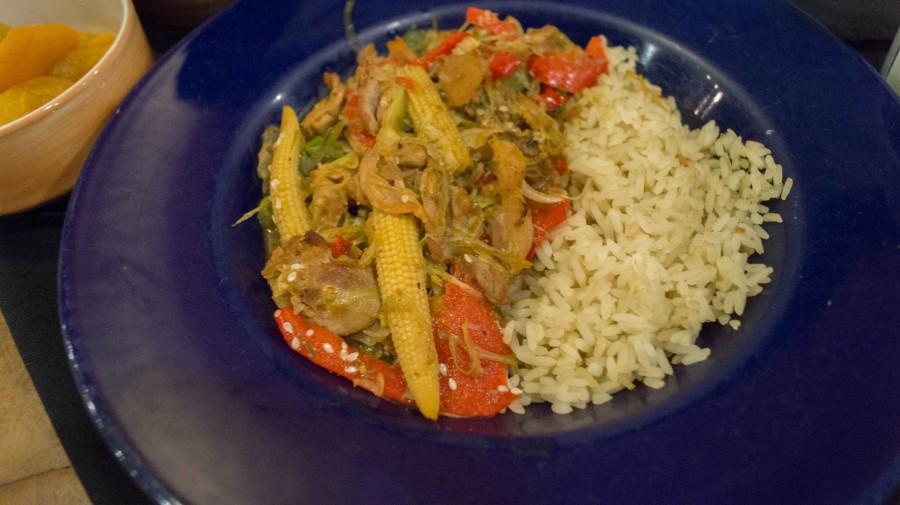Students debate food quality
Mar 10, 2016
Earlier this year, the University of Northern Iowa was ranked first in a list of best college food in Iowa for 2016, according to Niche.com. An article about UNI’s first place ranking was featured in the Feb. 22 issue of The Northern Iowan.
Since the publication of the article, some UNI students have voiced their disagreement.
The debate about food quality remains divided, as some students seem to think that the food provided by the university is much better in comparison to other universities in the state, while others are entirely disappointed.
Freshman environmental science major, Lily Conrad, is one such student who has expressed her discontent with the dining centers.
“I have only eaten in the dining centers a few times since I live off campus; however, it seems to me as though that the Piazza and Rialto provide an over-abundance of rather unhealthy food,” Conrad said. “Sure, there are fruit, vegetable and salad options, but they are not always very fresh, which makes it seem as though these foods are not a priority.
“I feel, overall, to see change in the food we need to have more people speaking out that they want change,” Wager said.
“In the future, I would like to see UNI promoting organic products around campus vendors and in the dining centers,” Conrad said. “We need to make our health a priority and ingrain positive habits into the lifestyles of UNI students.”
Karr cited the dining centers’ variety of items and willingness to listen to students’ wants and needs as part of the reason that UNI was recently recognized for having the best college food in Iowa.
“We’re proud of that honor and appreciate the recognition we’ve received from the students,” Karr said. “But of course there’s always room for improvement. We continue to look for ways to improve our operations and regularly seek student and guest feedback and implement new concepts and recipes.”
“As a vegetarian, there are plenty of meal options, although I always feel better after eating my own food because its quality is well known,” Conrad said. “I tend to question the status of food in the dining centers. Were pesticides or growth hormones used to produce this fruit?”
Allison Wager, a UNI student who is currently enrolled at the University of Texas through UNI’s National Student Exchange (NSE), said that she is dissatisfied with the quality of dining center food overall and would like to see some changes occur.
“What specifically is bothering me about the food at the dining centers is the large amount of unhealthy food,” Wager said. “Fried food is provided for students more than healthy food.”
Wager would go on to discuss how the healthy options that are offered are often the incorrect temperature.
“Most of the healthy food is cold to the point that I have to heat up the food in the microwave,” Wager said. “Also, a good portion of the food is not fully cooked. For example, the baked potatoes are still hard, corn casserole is soupy and that has raw egg in the recipe.”
Wager also mentioned that she would like to see letters written to Michelle Obama, who she believes can help move the cause forward and create change.
Annie Karr, assistant director of marketing and conferences for the Department of Residence (DOR), pointed out that each dining center on campus has 7-8 food stations and that only one of those stations serves fried food.
“The remaining stations are soup/salad, sandwiches, homestyle favorites, pizza, allergen/vegan-friendly,” Karr said. “So yes, we do serve fried food, but it is one option out of 100-plus other food options each day.”
Karr noted to The Northern Iowan that Wager has called the DOR “multiple, multiple, multiple times” complaining about dining service food.
“On a good day, the food is mediocre at Rialto,” said Luke Ferrari, freshman graphic design major. “It’s better than high school food because there are options, but I usually just go to the wrap station because those never disappoint.”
Ferrari said that it appears that the noodles served for late dinner are simply re-cooked from the night before, and that it seems like greasy burgers and fries are the only options.
“The tacos are really the only good thing,” Ferrari said.
Karr discussed the dining centers’ efforts to minimize improper cooking of food.
“We encourage guests to report any issues with quality as soon as possible so it can be resolved,” Karr said. “The Black Hawk County Health Inspector performs annual inspections, and we consistently receive high ratings. We take safety, sanitation and serving high quality food very seriously, which is important when you serve over 7,000 meals each day.”
There are some students who are very content with the food quality.
“I think they have a good amount of choices, especially with the special orders station,” said Mara Puente, freshman environmental science major. Puente went on to say that she believes that there are plenty of healthful options.
“I think the food is good. I don’t think people should anticipate their mother’s cooking when they come to college,” said Andrew Jessip, junior global studies major.
Some students have offered solutions of their own to fix the quality of dining center food.
“I feel, overall, to see change in the food we need to have more people speaking out that they want change,” Wager said.
“In the future, I would like to see UNI promoting organic products around campus vendors and in the dining centers,” Conrad said. “We need to make our health a priority and ingrain positive habits into the lifestyles of UNI students.”
Karr cited the dining centers’ variety of items and willingness to listen to students’ wants and needs as part of the reason that UNI was recently recognized for having the best college food in Iowa.
“We’re proud of that honor and appreciate the recognition we’ve received from the students,” Karr said. “But of course there’s always room for improvement. We continue to look for ways to improve our operations and regularly seek student and guest feedback and implement new concepts and recipes.”














